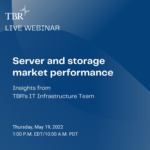Playing to its strengths, Infosys has a clear path forward to deliver business outcomes through Infosys Cobalt
In the company’s first event since the Infosys Leadership Forum in Americas in 2021, Infosys once again hosted clients, analysts and partners for in-person and virtual sessions during its one-day Infosys Cobalt World Tour, which was held at Madison Square Garden. With Infosys Cobalt increasingly becoming the backbone of the company’s performance and go-to-market efforts, the themes of the event were well aligned with Infosys’ goal of becoming a digital transformation partner known for its strong execution capabilities.
TBR left the Infosys Cobalt World Tour event with three takeaways that will guide our continuing analysis of Infosys’ cloud capabilities and performance:
- Infosys embraces a business-outcomes mindset, and Infosys Cobalt will enable the transformation.
- Infosys is obsessed with customer centricity, which we believe will be critical as the company scales “as a Service” sales and as renewal cycles shrink.
- Partners, talent and leadership culture strategies are mixing well at the moment, enabling Infosys to enhance results.
Infosys Cobalt becomes the de facto framework for accelerating performance in both legacy and new technology areas
With revenues from Digital reaching 59.2% of Infosys’ (Nasdaq: INFY) total sales in 1Q22, up from 51.5% a year ago, the company is demonstrating its ability to capitalize on its investments in portfolio, talent and alliance partners, all necessary ingredients for expanding client wallet share. Infosys defines its Digital services as being “comprised of service and solution offerings of the company that enable our clients to transform their businesses. These include offerings that enhance customer experience, leverage AI-based analytics and big data, engineer digital products and IoT, modernize legacy technology systems, migrate to cloud applications and implement advanced cyber security systems.”
Infosys wrapped up FY22 on a high note as the company registered its largest growth in over a decade, increasing revenues 20.3% on an annual basis to $16.3 billion. Infosys added $2.75 billion in net-new revenue in FY22, which was higher than the combined $2.62 billion in revenue from the three previous years. Infosys’ success was largely enabled by Infosys Cobalt as the company has been able to up- and cross-sell Cobalt to clients seeking to modernize and optimize IT architectures and business processes through adoption of cloud-ready services and solutions while lowering total cost of ownership. Infosys launched Infosys Cobalt, a suite of platforms, solutions and services, in August 2020.
Today Infosys Cobalt taps into the company’s catalog of over 35,000 assets, 300 cloud solutions blueprints, and a developer community of startups as well as public and private providers. While Infosys Cobalt has its own global leadership structure and P&L, Infosys’ decision to not set it up as a stand-alone unit but rather as a go-to-market framework that pulls assets from within Infosys and its broader ecosystem enables Infosys Cobalt to better support the company’s cloud performance. (TBR’s estimates of Infosys’ cloud revenue and growth can be found in TBR’s Cloud Professional Services Market Forecast).
Zooming in on client-centric support throughout the customer life cycle paves the way for ‘as a Service’ sales at scale
During the event, Infosys let clients tell the company’s story rather than having leadership lead the presentations, an approach that in TBR’s view was different than how peers usually run similar forums. The experiences and use cases they all shared further solidified Infosys’ cloud expertise including not only traditional lift-and-shift migration support but also its ability to engage in security-wrapped outcome-based business discussions rooted in Infosys’ technology execution prowess. Infosys’ clear vision around its cloud value proposition takes into account important aspects of enterprises’ business and digital transformation programs, including culture, talent and deepening clients’ trust.
In addition to facing challenges around culture and talent — issues that all vendors are grappling with industrywide — Infosys must also focus on deepening clients’ trust, particularly as it seeks to adopt “as a Service” pricing models at scale. Managing client relationships beyond the initial point of sale is key, and we believe Infosys will accelerate its efforts to adopt a beyond-the-contract type of mentality to ensure renewal rate goals are met, especially as cloud contracts pivot from traditional large, five-plus-year outsourcing setups to shorter-term subscription-based contracts where clients have an opportunity to switch between providers, further compelling Infosys to stay on top of relationships.
Though Infosys continues to hire in bulk, sales and support staff declined 50 basis points as a percentage of the total workforce to 5.1% to 16,156 in FY22, up from 14,582 in FY21, reflecting the company’s focus on its delivery staff as Infosys’ sales strategy succeeds in the market. Additionally, automation enables Infosys to standardize processes in service delivery, which we believe will be critical as Infosys scales “as a Service” sales. “Operation remains very core to us, [helping with] cost optimization every year. We’ve taken out between 3,000 to 4,000 people, automating and putting in bots, and this is fourth quarter.” — Nilanjan Roy, CFO, Infosys, 1Q22 earnings call
With business services pivoting from noncore to core, Infosys must also account for the twofold implication of scaling “as a Service” sales at scale. Monetizing both the development and management of cloud applications through a consumption-based commercial model carries risks and rewards for Infosys, a paradigm many systems integrators face. For example, Infosys needs to bear the cost of staffing its bench with engineers to develop the applications far in advance, often without knowing how long it will take to monetize the SaaS offering. Infosys has tried to pursue SaaS sales at scale in the past, but we believe the company now has a clearer vision, expectation and path forward on how to approach the opportunity. The incremental approach Infosys takes to scale its cloud-related sales is centered around Infosys Cobalt’s ability to deliver value-wrapped proprietary and partner assets in a services-oriented architecture, which solidifies Infosys’ value proposition within the ecosystem. Such a strategy allows Infosys to stay within its swim lane while also helping it demonstrate the company is willing to share risk without jeopardizing performance by attempting to sell stand-alone software solutions.
While Infosys’ Products and Platform offerings are available on both a license and subscription basis, the company still largely uses many of these assets to drive services engagements. As it relates to Infosys cloud sales, the Infosys Cobalt store provides an access point for clients to explore catalog offerings, with the underlying goal of driving services engagements for Infosys. The additional value of Infosys Cobalt offerings also comes from the company’s ability to wrap an industry layer on top of the technical functionality of these assets, such as the launch of the Infosys Cobalt Financial Services Cloud offering. The solution will support Infosys’ efforts to accelerate performance within its largest industry vertical and address client pain points around areas such as anti-money laundering, transaction reconciliation, open banking, consumer lending and mortgages. Such an offering enables Infosys to build trust with business unit leaders and expand the company’s addressable market especially as clients seek to monetize their user data generated through B2B and B2C interactions with cloud enabling the speed of access.
Balancing relationships within the stakeholder ecosystem without losing focus on talent and partners is key to strengthening trust with clients
As much as Infosys values the role of partners, the company recognizes the importance of its greatest assets — its people. However, Infosys has not been spared in the war for talent. The company continues to evolve its resource management value proposition from hiring for skills to hiring for potential, investing in talent development programs that target nontraditional recruits with the goal of establishing emotional connections with the brand, which could help strengthen loyalty and improve retention. For example, a collaboration between the Infosys Foundation USA and the CBS television series “Mission Unstoppable” will highlight three teachers from the foundation’s Pathfinders Institute program — Infosys’ professional development program for K-12 teachers in computer science. The company also expanded the Infosys Springboard learning program to the U.S., which currently has 1.2 million users largely in India, to support early learning as well as career reskilling programs in the U.S. as the region remains a priority for Infosys.
Further, the first group of apprentices graduated from Infosys’ New Apprenticeship (NEW) program, having undergone 12 months of structured and on-the-job training in IT services and incident management. NEW cohorts also earn certifications, such as ServiceNow Certified Systems Administrator, and can earn college credits at Southern New Hampshire University. While much of the cloud-related work today is largely geared toward cloud application development, migration and managed services, Infosys’ leadership sees a bigger gap in the support domain moving forward due to increasing use of low-code development tools, especially as the company seeks to scale deployment of Infosys Cobalt’s 35,000 assets including 300 industry solutions. Training staff on low-code/no-code solutions will help it build trust with business buyers while supporting Infosys Cobalt’s goal to evolve its value proposition toward delivering business outcomes.
As Infosys’ portfolio and go-to-market efforts enable the company to climb up the value chain within enterprises, the company remains realistic about its core strengths. The role of alliance partners is key across both technology and advisory services. Just as Infosys seeks to capitalize on partners’ capital expenditures outlays — particularly hyperscalers — and position itself as an ecosystem orchestrator, the company also appreciates the value consulting partners bring to the table. The recent formalization of the global partnership with EY, which is focused on deployment and management of industry-aligned digital assets, further solidifies Infosys’ ability to recognize its strengths rather than pursue risky bets and try to branch out into uncharted territories.
Infosys proves its value as an ecosystem orchestrator by applying the right technologies and partner-backed innovation to clients’ sustainability initiatives
The event showed across multiple levels that Infosys sticking to what it does best is highly advantageous when applied in a partner innovation setting, including around sustainability. Recognizing that no one vendor can do it all, Infosys’ EVP and head of manufacturing spoke at length during one session with a client executive from a global HVAC company about the two companies’ relationship around HVAC and building system sustainability, including how Infosys is leveraging the HVAC company’s capabilities as both a client and an innovation partner. With nearly 40% of the world’s carbon emissions coming from buildings, decarbonizing physical estates will be one of the most challenging tasks for enterprises, particularly as the majority of existing HVAC systems are not intelligent or connected in any way. The two companies are trying to tackle this issue and make the well-known phrase “what gets measured gets managed” a reality for the HVAC industry.
Through the conversation TBR came to understand that Infosys Cobalt provides the bridge for its partner’s HVAC expertise with the possibilities of IoT and big data. Work between the two companies has helped Infosys reduce its emissions (Infosys became carbon neutral as of 2020) and enabled the global HVAC company to track building efficiency and troubleshoot issues before even arriving on customers’ sites by leveraging the cloud and IoT-powered HVAC systems. While Infosys’ services line of business does not create emissions from manufacturing, its manufacturing clients can be confident that Infosys is bringing the right partners to the table, is a carbon-neutral supplier (therefore supporting its clients’ scope 3 downstream emissions targets), and can apply its technical prowess to help measure where clients are starting out, enabled by cloud.
Conclusion
From cyber to AI to industry specialization, Infosys Cobalt will continue to provide the bridge between Infosys’ core and new portfolio offerings while supporting the company’s efforts to extract additional wallet share from its client roster and pursue new logo opportunities. Just as Infosys’ leadership, clients and partners throughout the event recognized that scaling adoption of new ideas and solutions is less about technology and more about the culture of an organization, the same sentiment applies to Infosys’ internal transformation. Infosys’ organizational culture has gone through growing pains associated with its portfolio as well as client demands over the past four decades. It has not always been easy or straightforward and has sometimes resulted in shaky performance.
Today, Infosys’ culture is strong largely due to leadership’s ability to recognize the company’s place within the ecosystem. Despite rising attrition levels, which is an industrywide trend, Infosys’ approach to talent training and inclusion provides the strong foundation necessary to pursue organizational goals. Infosys Cobalt is no exception. Instead of setting it up as a stand-alone unit, an approach many of Infosys’ peers have taken with similar offerings, Infosys Cobalt spreads across the entire organization, leveraging the skills, expertise and industry knowledge of the company’s sales and delivery personnel. Ensuring Infosys Cobalt provides consistent and standardized client support is key, but could create internal competition when trying to pull the most skilled resources in multiple client engagements at the same time. However, this also presents an opportunity for Infosys to test its ability to become an ecosystem orchestrator. Adopting a customer zero mindset often provides the most valuable use case before deploying at scale to market.
TBR will continue to track and analyze Infosys’ performance and investments as part of its quarterly Infosys report, IT Services Vendor Benchmark, Global Delivery Benchmark and Digital Transformation research. Contact us today to gain full access to these upcoming publications.



